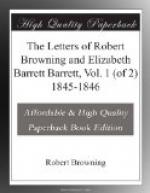Is it true that your wishes fulfil themselves? And when they do, are they not bitter to your taste—do you not wish them unfulfilled? Oh, this life, this life! There is comfort in it, they say, and I almost believe—but the brightest place in the house, is the leaning out of the window—at least, for me.
Of course you are self-conscious—How could you be a poet otherwise? Tell me.
Ever faithfully yours,
E.B.B.
And was the little book written with Mr. Mill, pure metaphysics, or what?
R.B. to E.B.B.
Saturday Night, March 1 [1845].
Dear Miss Barrett,—I seem to find of a sudden—surely I knew before—anyhow, I do find now, that with the octaves on octaves of quite new golden strings you enlarged the compass of my life’s harp with, there is added, too, such a tragic chord, that which you touched, so gently, in the beginning of your letter I got this morning, ‘just escaping’ &c. But if my truest heart’s wishes avail, as they have hitherto done, you shall laugh at East winds yet, as I do! See now, this sad feeling is so strange to me, that I must write it out, must, and you might give me great, the greatest pleasure for years and yet find me as passive as a stone used to wine libations, and as ready in expressing my sense of them, but when I am pained, I find the old theory of the uselessness of communicating the circumstances of it, singularly untenable. I have been ‘spoiled’ in this world—to such an extent, indeed, that I often reason out—make clear to myself—that I might very properly, so far as myself am concerned, take any step that would peril the whole of my future happiness—because the past is gained, secure, and on record; and, though not another of the old days should dawn on me, I shall not have lost my life, no! Out of all which you are—please—to make a sort of sense, if you can, so as to express that I have been deeply struck to find a new real unmistakable sorrow along with these as real but not so new joys you have given me. How strangely this connects itself in my mind with another subject in your note! I looked at that translation for a minute, not longer, years ago, knowing nothing about it or you, and I only looked to see what rendering a passage had received that was often in my thoughts.[1] I forget your version (it was not yours, my ’yours’ then; I mean I had no extraordinary interest about it), but the original makes Prometheus (telling over his bestowments towards human happiness) say, as something [Greek: peraitero tonde], that he stopped mortals [Greek: me proderkesthai moron—to poion euron], asks the Chorus, [Greek: tesde pharmakon nosou]? Whereto he replies, [Greek: tuphlas en autois elpidas katokisa] (what you hear men dissertate upon by the hour, as proving the immortality of the soul apart from revelation, undying yearnings, restless longings, instinctive desires which, unless to be eventually




